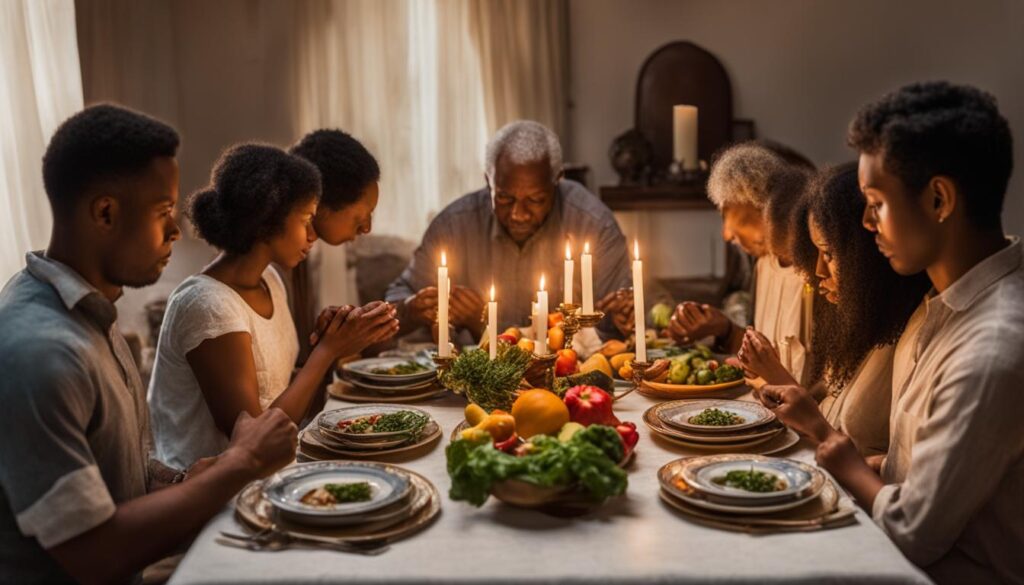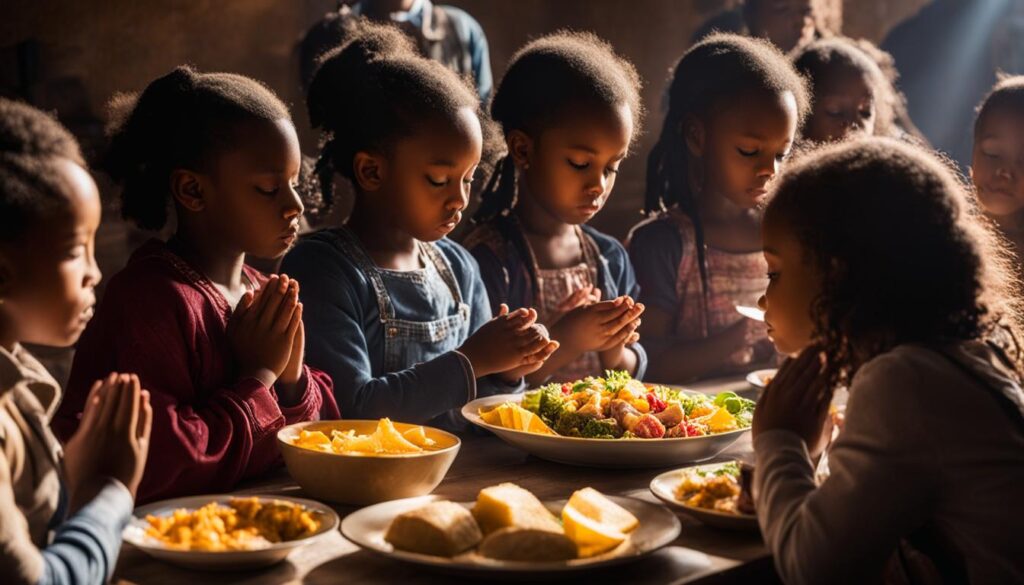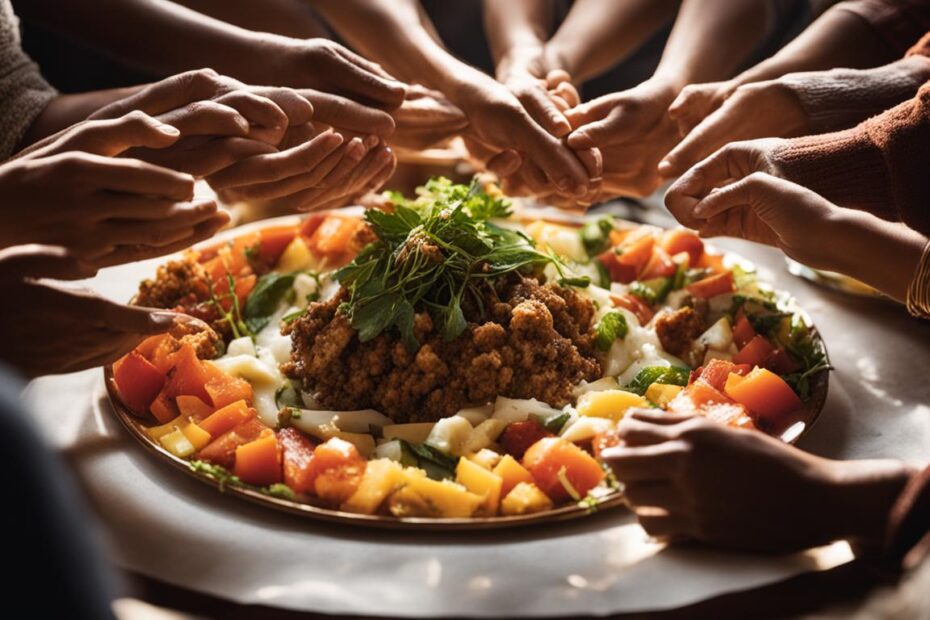Saying grace before meals is a time-honored tradition observed worldwide. It is a sacred moment to express gratitude and foster mindfulness. Both Jesus and Paul practiced saying grace before feeding multitudes, and Christians continue this tradition as a sign of respect and love for the Creator.
Key Takeaways:
- Mealtime prayers are a way to express gratitude and foster mindfulness
- Saying grace before meals is an ancient tradition practiced by Christians
- It is important to remember and acknowledge God as the provider of our food
- Establishing a mealtime prayer tradition can bring families and loved ones closer
- Being intentional with prayer can help create a consistent routine
Why is Praying Before Meals Important?
Praying before meals holds great significance in many cultures and religions. It is a practice that allows individuals to express gratitude and acknowledge the role of a higher power in providing sustenance. By taking a moment to give thanks to God or a divine entity, mealtime prayers help cultivate a sense of appreciation for the blessings of food and nourishment.
One of the benefits of saying grace before eating is that it helps us to slow down and be present in the moment. In our fast-paced lives, mealtime often becomes rushed, and we may not fully appreciate the nourishment we receive. Praying before meals allows us to pause, reflect, and savor not just the physical sustenance but also the spiritual connection we have with the food we consume.
Moreover, praying before meals provides an opportunity to connect with God and strengthen relationships with loved ones. It can be a shared practice within families, bringing them closer together and creating a sense of unity. By engaging in prayer together, we bond over our shared beliefs and values, fostering a deeper connection with one another and with the divine.
The Benefits of Saying Grace:
- Expressing gratitude for food
- Fostering mindfulness and appreciation for nourishment
- Creating a sense of unity and connection within families
- Strengthening the spiritual bond with a higher power
How to Establish a Mealtime Prayer Tradition
Establishing a mealtime prayer tradition can bring a sense of intentionality and spirituality to your daily routine. By incorporating prayer into your meals, you create an opportunity to express gratitude, foster mindfulness, and deepen your connection with the divine. Here are some practical steps to help you establish a meaningful mealtime prayer tradition:
Create a Prayer Routine
The first step in establishing a mealtime prayer tradition is to plan a daily prayer routine for breakfast, lunch, and dinner. Decide on a consistent time for each meal where you can gather as a family or individually to offer a prayer of gratitude before eating. This routine will help set the expectation for prayer and make it an integral part of your mealtime experience.
Designate a Prayer Leader
To make mealtime prayer more inclusive, consider designating a different prayer leader for each meal or rotating the responsibility around the table. This allows everyone in the family or group to participate in the prayer tradition and share their gratitude with all. It can also be a meaningful way to involve children and teach them the importance of prayer.
Encourage Creative Mealtime Prayers
Mealtime prayers don’t have to be limited to the same words or phrases each time. Encourage creativity by allowing individuals to personalize their prayers or by introducing different prayer formats. You can incorporate poetry, songs, or even write your own prayers tailored to specific occasions or needs. This creativity will keep the prayers fresh and meaningful, allowing for a deeper connection with the divine.
Emphasize Consistency
Consistency is key when establishing a mealtime prayer tradition. Make a commitment to pray before every meal and strive to maintain this practice even on busy or challenging days. By prioritizing consistent prayer, you reinforce the habit of gratitude and ensure that prayer remains a regular part of your mealtime routine.

Table: Steps to Establish a Mealtime Prayer Tradition
| Step | Description |
|---|---|
| Create a Prayer Routine | Plan a daily prayer routine for breakfast, lunch, and dinner. |
| Designate a Prayer Leader | Rotate the responsibility of leading the prayer around the table or designate a different leader for each meal. |
| Encourage Creative Prayers | Allow individuals to personalize their prayers and introduce different prayer formats. |
| Emphasize Consistency | Commit to praying before every meal, even on busy or challenging days. |
By following these steps and being intentional with your mealtime prayers, you can establish a meaningful tradition that enriches your spiritual life and fosters gratitude.
Traditional Mealtime Prayers
Mealtime prayers have been a cherished tradition for generations, offering a moment of gratitude and reverence before enjoying a meal. These traditional prayers serve as a way to acknowledge the blessings of food and express thankfulness to God. Here are a few examples of common grace prayers that have been passed down through the years:
| Prayer | Description |
|---|---|
| “Bless us, Oh Lord” | A simple prayer that asks for God’s blessing on the food and expresses gratitude for His provision. |
| “May All Be Fed” | A prayer that seeks to extend the blessings of the meal to those who are hungry and in need, fostering a spirit of compassion. |
| “Meal Prayer” | A straightforward prayer that thanks God for the food and asks for His continued presence and guidance in our lives. |
These traditional mealtime prayers carry a sense of familiarity and comfort, connecting us to the generations before us who also gathered around the table to give thanks. They serve as a reminder of the goodness of God and the abundance of His blessings.
While these prayers provide a solid foundation, it is important to remember that prayer is a personal and individual expression of faith. Feel free to modify or create your own mealtime prayer that resonates with your beliefs and intentions. The key is to cultivate a spirit of gratitude and reverence before partaking in a meal.
Let us continue to embrace the rich tradition of mealtime prayers, cherishing the opportunity to give thanks and seek God’s blessings as we come together around the table.
https://www.youtube.com/watch?v=OMerO0jeOGQ
Prayers for Specific Occasions or Situations
Mealtime prayers can be tailored to specific occasions or situations, adding a personal touch to the act of giving thanks. These prayers allow for a deeper connection with our faith and address specific needs or concerns. Here are some examples of prayers for different occasions:
Prayer for Thanksgiving:
“Dear God, on this day of gratitude, we gather to give thanks for the blessings in our lives. We are grateful for the abundance of food before us and for the love and company of family and friends. Bless this meal and our time together. Amen.”
Prayer for Special Meals:
“Heavenly Father, as we gather to celebrate this special occasion, we are reminded of your love and provision. Bless this food and the hands that prepared it. May this meal nourish our bodies and our souls. Amen.”
Prayer for Those in Need:
“God, we lift up in prayer all those who are hungry and in need. May they find comfort and sustenance in your love. Guide us to be instruments of your compassion and help us share our blessings with others. Amen.”
These prayers can be modified and personalized to suit the specific circumstances. Whether it’s a holiday, a special event, or a moment of reflection, taking the time to offer a prayer that addresses the situation adds meaning and depth to the act of saying grace.

Mealtime Prayers for Children
Teaching children to say grace before meals is a wonderful way to instill gratitude and mindfulness from a young age. It helps them develop a habit of expressing thanks for the blessings they receive on their plates. Simple mealtime prayers that are easy for children to remember and understand can be introduced, creating a meaningful and inclusive prayer tradition for the whole family.
One popular mealtime prayer for children is:
“Do not look to others for strength
Do not look to things for joy
Look to God, our Father above
And thank Him for every meal we enjoy”
This prayer is short and concise, making it perfect for young children to memorize and recite before each meal. Encouraging children to actively participate in prayer by offering their own words of thanks can also be a great way to engage them and make the experience more personal.
Simple Mealtime Prayers for Kids
Here are a few other examples of simple mealtime prayers for children:
- “Thank you, God, for this food. We are grateful for all that is good.”
- “Bless this food we eat today, keep us safe and help us play.”
- “Dear God, thank you for this meal. Help us grow strong, healthy, and kind.”
These prayers can be a starting point for parents and caregivers to introduce the practice of saying grace before meals. As children grow older, they can be encouraged to personalize their prayers and express their own gratitude.

Creating a mealtime prayer tradition not only teaches children the importance of gratitude and mindfulness but also strengthens the bond within the family. It is a beautiful way to come together and give thanks for the nourishment and blessings we receive each day.
Praying Before Eating Out
Praying before meals at restaurants is not only a personal act of gratitude, but it can also serve as a powerful example to those around you. Saying grace in public settings demonstrates your faith and can inspire others to connect with their spirituality. Whether you’re dining alone or with a group, taking a moment to offer a prayer can be a meaningful way to show appreciation for the food you are about to enjoy.
When it comes to saying grace in public, simplicity is key. A short and heartfelt prayer is often the most effective way to express gratitude while maintaining a sense of privacy. You can silently offer a prayer of thanks, or if you feel comfortable, you may choose to quietly say the prayer out loud. Remember to be respectful of those around you, keeping your voice low and maintaining a reverent demeanor.
If you’re unsure of what to say when dining out, here is a simple prayer to bless the food:
“Dear God, thank you for this meal before us. Bless the hands that prepared it and the nourishment it provides. Amen.”

Remember, saying grace while dining out is not about drawing attention to yourself, but rather about expressing gratitude and connecting with the divine in a public setting. By continuing the practice of saying grace in restaurants, you not only honor your own faith, but you may also inspire others to pause and give thanks in their own lives.
Praying for Others While Saying Grace
While saying grace before a meal, we have the opportunity to extend our prayers and thoughts to others who may be in need. Intercessory prayer during mealtime allows us to express empathy, compassion, and support for those facing challenges or difficulties. It is an act of selflessness that reinforces our gratitude and reminds us of the interconnectedness of humanity.
Praying for others can take many forms and can be tailored to specific needs or circumstances. It may include prayers for the poor and hungry, asking for blessings upon those facing adversity, or offering gratitude for the health and well-being of family and friends. These prayers not only foster our own compassion and empathy but also serve as a reminder of the power of collective prayer in creating positive change.
As we say grace and express our thankfulness for the food on our table, let us also remember and uplift those who may be in need. Through intercessory prayer during mealtime, we can make a difference in the lives of others, even from the confines of our own dinner table.
Reflecting on Scripture While Saying Grace
Reflecting on Scripture while saying grace can be a powerful way to deepen our spiritual connection during mealtime. By incorporating biblical grace prayers and using Psalms in our mealtime prayers, we can engage with the Word of God and draw closer to His presence.
When we reflect on Scripture, we open ourselves up to the wisdom and guidance found in God’s Word. As we say grace before a meal, we can meditate on verses that speak to the goodness of God’s provision and His faithfulness. For example, Psalm 136 reminds us of the Lord’s steadfast love and how He provides food for all creatures, while Psalm 104 praises God for His role as Creator and Sustainer of life.
Using biblical grace prayers and the Psalms in mealtime prayers not only enriches our own spiritual experience but also sets an example for those around us. It shows our reverence for the Scriptures and our desire to align our hearts with God’s will. It can also be a valuable teaching moment for children, as they learn the importance of incorporating God’s Word into their everyday lives.

Example of a Grace Prayer with Scripture:
Heavenly Father, as we come before you to partake in this meal, we are reminded of your abundant grace and provision. Just as you fed the multitude with a few loaves and fish, we trust that you will bless and multiply what is before us. We thank you for your words in Psalm 107:9, which declares, “For he satisfies the longing soul, and the hungry soul he fills with good things.” May this meal nourish our bodies and our spirits, and may it remind us of your unwavering love and provision in our lives. In Jesus’ name, amen.
Table: Benefits of Reflecting on Scripture While Saying Grace
| Benefits | Explanation |
|---|---|
| Deeper Spiritual Connection | Reflecting on Scripture while saying grace allows us to draw closer to God and experience a deeper connection with Him. |
| Guidance and Wisdom | Engaging with the Word of God during mealtime prayers provides us with guidance and wisdom for our daily lives. |
| Teaching and Example | Using biblical grace prayers and the Psalms as part of our mealtime prayers sets an example for others, especially children, and teaches them the importance of incorporating Scripture into their lives. |
| Nourishment of Body and Spirit | Reflecting on Scripture while saying grace can nourish not only our physical bodies but also our spiritual well-being. |
By reflecting on Scripture while saying grace, we deepen our understanding of God’s provision, express our gratitude, and invite His presence into our mealtimes. Whether it’s through reciting biblical grace prayers or incorporating specific Psalms into our prayers, this practice can transform our mealtime experience and foster a greater sense of reverence for God’s Word.
Conclusion
Mealtime prayer holds significant importance in fostering gratitude and mindfulness. It is a time-honored tradition that allows us to express our appreciation to God for His provision and blessings. By taking a moment to pause before eating, we can cultivate a sense of mindfulness and savor the nourishment before us.
Establishing a mealtime prayer tradition can bring families and loved ones closer, creating a shared moment of connection and gratitude. Whether it’s a simple grace or a personalized prayer, the act of saying grace before meals can deepen our spiritual connection and strengthen our relationships.
Mealtime prayers also offer the opportunity for creative and meaningful expressions of faith. By tailoring prayers to specific occasions or addressing specific needs, we can engage in intercessory prayer and extend our compassion to others. Reflecting on Scripture during grace can provide guidance and inspiration, enhancing our understanding of God’s provision and love.
In summary, mealtime prayer is a practice that goes beyond simply giving thanks. It is a practice that fosters gratitude, mindfulness, and spiritual connection. So, let us embrace this beautiful tradition and allow it to enrich our lives and nourish our souls.
FAQ
What prayer should I say before eating?
There are various traditional mealtime prayers that can be said before eating. Some examples include “Bless us, Oh Lord,” “May All Be Fed,” and “Meal Prayer.” You can also personalize your prayer to address specific needs or occasions.
Why is it important to pray before meals?
Praying before meals is important because it allows us to express gratitude to God for His provision and blessings. It fosters mindfulness, helps us slow down and savor our meals, and strengthens our relationship with God and loved ones.
How can I establish a mealtime prayer tradition?
To establish a mealtime prayer tradition, you can be intentional about planning daily prayer routines for breakfast, lunch, and dinner. Designate a person or rotate around the table for prayer to make it more inclusive. Encourage creativity in mealtime prayers to keep them fresh and meaningful. Consistency is key in making mealtime prayer a regular part of your routine.
Are there any traditional mealtime prayers?
Yes, there are traditional mealtime prayers that have been passed down through generations. Some examples include “Bless us, Oh Lord,” “May All Be Fed,” and “Meal Prayer.” These prayers express gratitude, ask for blessings on the food, and acknowledge the goodness of God.
Are there prayers for specific occasions or situations?
Yes, you can tailor mealtime prayers to specific occasions or situations. For example, you can say a prayer for Thanksgiving or a prayer for those who are hungry and in need. These prayers allow for personalization and addressing specific needs or concerns.
How can I teach children to say grace?
Teaching children to say grace can instill gratitude and mindfulness from a young age. Introduce simple mealtime prayers that are easy for children to remember and understand. Make the prayers interactive and encourage children to participate in prayer.
Should I pray before eating out at restaurants?
Yes, praying before meals at restaurants is an opportunity to express gratitude and bear witness to others. It is important to continue the practice of saying grace even in public settings. A simple prayer to bless the food and express gratitude can be used when dining out.
How can I pray for others while saying grace?
Praying for others while saying grace allows us to extend our gratitude and compassion to those in need. This can include prayers for the poor and hungry, prayers for those facing adversity, or prayers for family and friends. Intercessory prayer during mealtime helps us remember and support others in our prayers.
Can I reflect on Scripture while saying grace?
Yes, reflecting on Scripture while saying grace can deepen the spiritual connection during mealtime. Using Psalms, such as Psalm 136 or Psalm 104, can provide guidance and inspiration for mealtime prayers. It allows for a deeper understanding of God’s provision and love while expressing gratitude.
What is the significance of praying before meals?
Praying before meals is a significant practice that fosters gratitude, mindfulness, and spiritual connection. It allows us to express gratitude to God for His provision and blessings. Establishing a mealtime prayer tradition can bring families and loved ones closer.
What are the benefits of saying grace before meals?
Saying grace before meals helps us slow down and savor our meals, fostering a sense of mindfulness and appreciation. It is an opportunity to connect with God and strengthen relationships with loved ones. It also reminds us to acknowledge that God is the provider of our food and helps us express gratitude for His blessings and provision.








